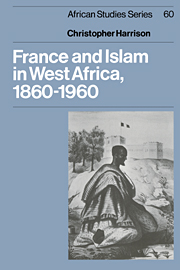Book contents
- Frontmatter
- Contents
- Acknowledgements
- Abbreviations
- Map
- 1 Introduction
- PART I 1850–1898: NINETEENTH-CENTURY ORIGINS OF FRENCH ISLAMIC POLICY
- PART II 1898–1912: THE FEAR OF ISLAM
- PART III FRENCH SCHOLARSHIP AND THE DEFINITION OF ISLAM NOIR
- Introduction
- 6 Scholar-administrators and the definition of Islam noir
- 7 The First World War
- PART IV 1920–1940: THE FRENCH STAKE IN ISLAM NOIR
- Notes
- Bibliography
- Index
6 - Scholar-administrators and the definition of Islam noir
Published online by Cambridge University Press: 01 February 2010
- Frontmatter
- Contents
- Acknowledgements
- Abbreviations
- Map
- 1 Introduction
- PART I 1850–1898: NINETEENTH-CENTURY ORIGINS OF FRENCH ISLAMIC POLICY
- PART II 1898–1912: THE FEAR OF ISLAM
- PART III FRENCH SCHOLARSHIP AND THE DEFINITION OF ISLAM NOIR
- Introduction
- 6 Scholar-administrators and the definition of Islam noir
- 7 The First World War
- PART IV 1920–1940: THE FRENCH STAKE IN ISLAM NOIR
- Notes
- Bibliography
- Index
Summary
The Futa Jallon was not the only area in which the French feared an Islamic rebellion in 1911. In March Clozel, the Lieutenant-Governor of Upper Senegal and Niger, telegrammed Ponty warning him of three marabouts recently returned from Mecca who were rumoured to be plotting against the French. Neither Ponty nor Clozel thought there was much substance to the rumours but, nonetheless both thought that in view of recent events in Futa Jallon it would be wise to take precautions. Ponty immediately wrote to the Governors of Senegal, Mauritania and Guinea informing them of the rumours and asking them to make discreet enquiries. He thought it necessary, however, to ask the Governors ‘to moderate… the zeal of certain administrators who might be tempted to make premature arrests whose only results would be to excite fanaticism and perhaps unleash local movements against us’. In Senegal, recruitment for the Moroccan campaign and fears of a renewed Yellow Fever epidemic, made the authorities particularly apprehensive. In June, Cor, the Lieutenant-Governor, wrote to Ponty that ‘Circumstances have never been as favourable for an Islamic rebellion as they now are in the colony…. Those who watch from the side of Islam – and they are still numerous – are aware of the circumstances which would make it very difficult for us to repress troubles were they to occur’. Cor proposed to conduct an investigation into the state of Islam in the cercles of the Fleuve, Niani-Ouli and Upper Gambia.
- Type
- Chapter
- Information
- France and Islam in West Africa, 1860–1960 , pp. 94 - 117Publisher: Cambridge University PressPrint publication year: 1988



